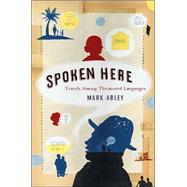
| Patrick's Language | p. 1 |
| Dreamers: Languages in Northern Australia | p. 13 |
| Constructing the World | p. 43 |
| Unseen and Unheard: Yuchi | p. 53 |
| Dont Vori, Bi Khepi | p. 83 |
| Leaving the Grave: Manx | p. 95 |
| The Verbs of Boro | p. 121 |
| The Lion's Tongue: Provencal | p. 128 |
| Melting at the Edges | p. 156 |
| The Words That Come Before All Else: Mohawk | p. 163 |
| Humboldt's Parrot | p. 190 |
| Ways of Escape: Yiddish | p. 201 |
| Revival | p. 229 |
| The Iron of Language: Welsh | p. 240 |
| The Face of All the Earth | p. 272 |
| Sources | p. 283 |
| Acknowledgments | p. 299 |
| Index | p. 303 |
| Table of Contents provided by Ingram. All Rights Reserved. |
The New copy of this book will include any supplemental materials advertised. Please check the title of the book to determine if it should include any access cards, study guides, lab manuals, CDs, etc.
The Used, Rental and eBook copies of this book are not guaranteed to include any supplemental materials. Typically, only the book itself is included. This is true even if the title states it includes any access cards, study guides, lab manuals, CDs, etc.